Dental Implants Ridgefield
Tooth Replacement Designed to Last for Decades

If you’re missing one or more teeth, you might struggle to smile confidently or chew your favorite foods. However, those aren’t the only problems that missing teeth can cause. Tooth loss can also contribute to serious oral health conditions such as gum disease, weakening of the jawbone, and the shifting and loss of other teeth. Fortunately, at Ridgefield Perfect Smile Center, our highly skilled professionals can replace your missing teeth with a near-permanent solution – dental implants. Not only do dental implants in Ridgefield have the potential to last a lifetime, but they also look and feel exactly like your natural teeth. To learn more, give our office a call today.
Why Choose Ridgefield Perfect Smile Center for Dental Implants?
- Partnered with Local Ridgefield Implant Specialists
- Low-Interest Dental Financing Plans Available
- Advanced Dental Technology Ensures Great Results
What Are Dental Implants?
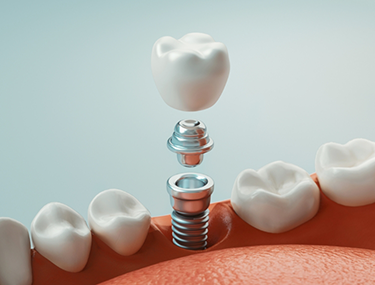
Dental implants are tiny, screw-shaped titanium rods that are designed to mimic the roots of natural teeth. They are surgically placed within the jaw where the roots of lost teeth used to be. Then, the jawbone actually begins to grow around them, creating a foundation as rock-solid as that of the teeth you were born with. At that point, we can secure a tailor-made dental crown, bridge, or denture (depending on the number of teeth you’re missing) onto your implants to recreate your smile.
The 4-Step Dental Implant Process
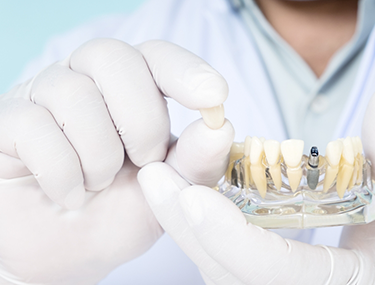
The dental implant process can be tricky. Unlike dentures or bridges, implants force a dentist to take complex steps. Treatment can span several months. Even so, the procedure’s perks are worth this time and effort. While each patient’s journey to a complete smile with dental implants is unique, you can expect four main steps in the process: consultation, surgery, osseointegration, and delivery of the final restoration.
Initial Dental Implant Consultation
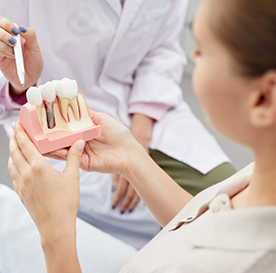
Implant work starts with a consultation. Generally, this visit is a brief talk with our dentists regarding your treatment. It gives our office an idea of your prior oral health, medical history, and smile goals. Learning such things lets us assess whether implants suit you.
All that said, we can still help if you don’t qualify for implants at first. We’ll gladly work to get you any needed preliminary procedures – gum disease therapy, tooth extraction, bone grafting, etc. Once you’ve had them, your mouth should be able to support dental implants.
If we approve, the consultation will cover the details of your implant work. Such facts include the treatment timeline, cost, and similar matters.
Dental Implant Surgery

To ensure the best results for this key step in dental implant treatment, we’ll refer you to a trusted local specialist for placement. This minor surgery will place the dental implants into your jawbone. Here’s what you can typically expect:
- Anesthesia – Before surgery, the surgeon will numb your mouth with an anesthetic. That means you won’t sense pain from the implant work. At most, you’ll only feel a slight pressure as our dentists operate.
- Minor incision – A small gum incision will be made once the treatment site is numb to access where the dental implant will be placed.
- Implant placement – The surgeon will then place your implant using advanced dental methods and tools.
- Gum closure – Your gums will be carefully closed around your implant, and a small cap will be placed on top to protect the site and maintain your gum shape.
Dental Implant Osseointegration & Abutment
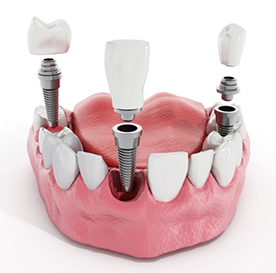
Your implant(s) will slowly fuse with your jaw once the surgery is over. This process – also known as “osseointegration” – takes roughly 4-6 months. When it’s finished, your implant post(s) will be permanent and remain both steady and secure.
After the fusion has ended, you’ll get another minor surgery. This second one sets an abutment (i.e., a metal connector) over your implant. When placed, this part will secure your final restoration. (The latter will be crafted from earlier dental impressions.).
Delivery of Dental Implant Restoration(s)
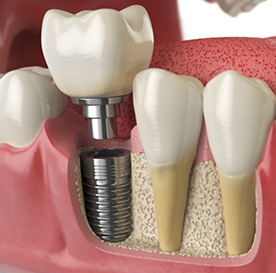
You’ll receive your final restoration at the end of the implant process. Given how many teeth you’ve lost, it might be a crown, bridge, or denture.
We won’t need long to fit the final restoration. Typically, this last bit only needs some cement work. Your dentist will then make some last-minute changes to ensure good results. From there, you’ll be ready to enjoy your new, restored smile.
Benefits of Dental Implants

One of the reasons that dental implants are so unique is that they can be used to replace one tooth, multiple teeth, or even a whole smile. However, there are other advantages that you simply can’t get with other tooth replacement options, including:
- Health – Dental implants are the only replacement solution that preserves your jawbone after tooth loss by stimulating it exactly like the roots of your natural teeth do.
- Strength – Rooted in your jawbone, dental implants allow you to chew through a wide range of foods for a more enjoyable and nutritious diet.
- Longevity – With proper care, patients can enjoy dental implants for a lifetime.
- Confidence – With a complete, strong, and beautiful smile, you can flash your grin, eat, speak, and laugh in public with confidence.
Who Dental Implants Can Help

As long as you’re an adult who is in generally good health, you probably qualify for dental implant treatment. This solution can bring back any number of lost teeth, and the type of restoration you receive will vary based on this number:
Missing One Tooth
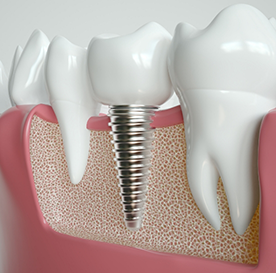
If your dental implant is replacing a single missing tooth, then the post is topped with a beautiful porcelain crown. Our dental crowns are custom-made to match the shade of your natural smile for a seamless tooth replacement. And, unlike regular dental bridges, a dental implant doesn’t require that your existing tooth structure be modified.
Missing Multiple Teeth
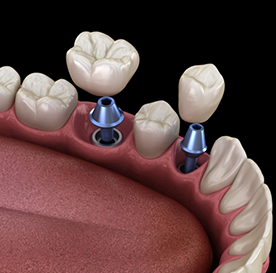
Your dental implant dentist in Ridgefield can replace multiple consecutive missing teeth with an implant bridge. This custom-made prosthetic is supported by dental implants on either side to fill the gap in your smile. The best part is, it will look, feel, and function like your natural teeth.
Missing All Teeth
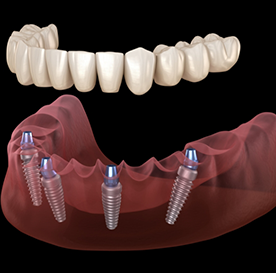
Are you missing all or most of your teeth on one or both arches? We can attach a denture to an average of four to six dental implants for a full, strong, and healthy smile. With implant dentures, we can replace a whole row of your teeth using the security that dental implants provide.
Understanding the Cost of Dental Implants

If you’re curious about the cost of your dental implants, the best way to receive a precise estimate is to come into our office. Because of the many variables that can influence the price of your treatment, we must examine your mouth before providing a cost estimate. The number of teeth you’re missing, the condition of your oral health, and the strength of your jawbone are just some of the factors that can contribute to the cost of your implants. Additionally, you should know the type of restoration that you need will also impact the price of your overall treatment.
Dental Implant Failure & Salvage
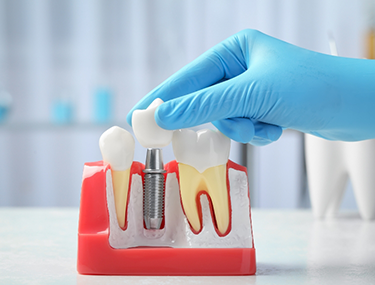
We take every possible step to make your dental implants a success, but it’s still important to be aware of issues that can lead to failure, such as an infection of the gums. Call us immediately if you believe there’s a problem with your dental implant posts. In many cases, we can salvage your new smile by identifying the underlying problem and treating it appropriately. If your implants need to be removed, new ones might be placed once your mouth is healthy again.
Learn More About Dental Implant Failure & Salvage
Maintaining & Caring For Your Dental Implants

Dental implants are designed to mimic natural teeth as closely as possible, which means they need to be extremely durable and reliable as well. However, just like your natural teeth that came before them, you need to be taking everyday steps to keep them healthy. That includes basic brushing and flossing at home, but it also includes a handful of other steps. Thankfully, adding them to your daily habits is a relatively simple process.
Make Oral Hygiene a Priority

Plaque can still build up on the gum tissue surrounding your dental implant, causing an infection. This can put your dental implant at risk of failure. Even though the restoration attached to your dental implant will not develop decay, you still need to brush twice a day for at least two minutes at a time and floss daily to remove food debris from between teeth. For extra protection, you can use a fluoridated oral rinse to clean hard-to-reach areas of your mouth.
Eat a Healthy Diet

Your diet impacts your oral health in more ways than you may have known previously. For example, eating lots of foods high in sugar and starch will make it easier for oral bacteria to produce plaque acids. These acids are responsible for creating plaque and tartar buildup, which damages your enamel and gum tissue. Make sure your meals consist of a balance of fruits, vegetables, lean proteins, whole grains, and dairy products to get the vitamins and minerals your body and smile need.
Break Bad Habits

Many bad habits can happen when you’re not even consciously thinking about them. For example, nail-biting, using your teeth to open packages, smoking or using tobacco, and chewing on very hard or inedible objects (i.e., ice cubes, popcorn kernels, pens, pencils, etc.) can all damage dental implant restorations and the posts integrated into your jaw. If your habits are a result of stress, find alternative coping mechanisms that don’t involve harming your teeth or dental implants. Have tools nearby to perform certain tasks so you aren’t inclined to use your mouth.
Protect Your Dental Implants

Whether you’re particularly active in sports or you have a teeth grinding habit while you sleep, you’ll need to provide your dental implants with the protection they need to remain healthy and free of damage. A quick and relatively affordable solution is a custom mouthguard. This oral appliance provides a cushion between the teeth and reduces the risk of damage either following a sudden injury or months and years of grinding and clenching. Professionally made mouthguards provide the best longevity, comfort, and protection overall compared to store-bought solutions.
Schedule Regular Dental Checkups

Setting up appointments once every six months is key to maintaining the lifespan of your dental implants. This gives us a chance to confirm your brushing and flossing at home is working as intended. If there are any problems present, we’ll have a chance to address them in the earliest stages when they are easier to treat.
Dental Implant FAQs
Can I Take Out My Dental Implant?
A dental implant is designed to provide a permanent solution. A titanium post is surgically placed in your jaw, which your bone will fuse through a process called osseointegration. Therefore, only a trained professional can remove a dental implant, such as in cases of failure. While you can’t take out the posts, some implant dentures are removable to make them easier to clean.
How Long Do Dental Implants Last?
Dental implants are proven to last for 30 years or longer with proper care. Your health and lifestyle will influence their lifespan. You can protect your investment with a solid oral hygiene routine at home. Besides brushing and flossing, use a daily mouth rinse to remove any food particles or bacteria left behind by your toothbrush. Your implant dentist in Ridgefield will recommend breaking any bad habits that might damage your new smile, like eating hard/sticky foods or using your teeth to open packages. You should also see your dentist at least twice a year for a cleaning and checkup. With a few precautions, your new smile can last for decades longer than traditional bridges and dentures.
How Can I Tell If My Dental Implant Is Failing?
Dental implants are the most reliable method of treating tooth loss. The risk of failure is less than 5%; however, if you notice any signs of complications, don’t wait to contact our office. It’s crucial you don’t ignore any pain or inflammation around the implant. Your post should always feel stable. If you develop any of these symptoms or your implant feels loose, time is of the utmost importance. Your dentist will pinpoint the problem to provide the necessary intervention to prevent dental implant failure.
Am I Too Old to Get Dental Implants?
You are never too old to replace your missing teeth, even when wanting dental implants. There isn’t an age limit for the revolutionary procedure; however, older people can have certain medical issues that can complicate the treatment. Pre-existing medical conditions don’t disqualify you from getting dental implants. Instead, your implant dentist will assess your risk factors to create a personalized strategy to replace your lost teeth safely.
How Long Does Dental Implant Surgery Take?
On average, a single implant is placed in 1-2 hours, which includes the time it takes to dress you for surgery and administer anesthesia. If you need multiple implants, your dentist will explain exactly how long your procedure is expected to last. It can take a few hours for the effects of any sedatives or anesthesia to wear off, so you’ll need a friend or loved one to drive you home for your appointment.
Does It Hurt to Get Dental Implants?
No one wants to experience pain while in the dental chair, but there isn’t any reason to worry. You won’t feel anything during your placement surgery because your oral surgeon will use a local anesthetic and sedative to block pain signals. Not to mention, your jawbone doesn’t have any nerve endings. You can expect some soreness as the effects of any medications dissipate, but you can manage it using an OTC or prescribed pain reliever. Within a few days, your discomfort will improve.

